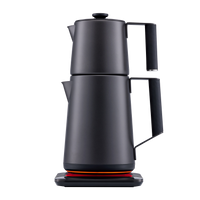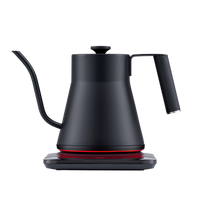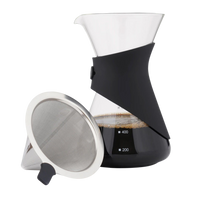turkish coffee beans: selecting and storing guide

Summary: Immerse yourself in the rich tradition of Turkish coffee. From selecting the finest beans to brewing the perfect cup, this guide is your gateway to mastering this esteemed coffee art. Perfect for both the seasoned aficionado and the curious beginner, we provide insights and tips for an authentic coffee experience.
Turkish Coffee Beans
Turkish coffee's journey begins with its beans. Historically, during the Ottoman Empire, Ethiopian and Yemen coffee beans were the stars. Ethiopian beans have a reputation for their fruity and floral notes, offering a gentle and well-balanced experience. Yemen beans, on the other hand, bring chocolate and spicy notes, leading to an intense and strong coffee flavor.
Fast forward to today, and the scene has slightly shifted. Now, coffee roasters predominantly use arabica coffee beans from Central and South America, offering a new spectrum of flavors. For those who crave a stronger taste, a blend of arabica and robusta beans is a popular choice.
This shift in bean choice reflects a broader palette of flavors. Arabica beans have a smooth, yet rich, profile, which makes them an ideal base for Turkish coffee. When selecting beans, aim for high quality and finely ground options, as they greatly influence the coffee's taste.
Roasting and Grinding
Roasting is a critical step in Turkish coffee preparation. Beans are typically roasted medium or dark, which is integral to its distinctive flavor. After roasting, the beans are ground to an ultra-fine powder, even finer than espresso. This fine grind, often referred to as Turkish coffee grind size, is crucial for achieving the right texture and flavor.
For enthusiasts who cherish fresh grinds, a Turkish coffee grinder is a great investment. It allows for grinding fresh beans for each cup, ensuring the finest quality. Alternatively, for convenience without compromising on quality, consider SAKI’s freshly ground Turkish coffee, Kahveji.
Storing Your Turkish Coffee
Proper storage of the coffee beans is important to maintaining the quality of your coffee. Keep your finely ground coffee in an airtight container, shielded from light and moisture. This preserves its freshness and aroma, ensuring an exceptional brew every time.
- Grind on Demand: Ideally, purchase whole beans and grind them just before brewing to capture the freshest flavor. This might not always be practical, but it's worth it for that perfect cup.
- Buy in Small Batches: Turkish coffee grounds can lose its freshness quickly after opening the package. So it is advisable to buy smaller quantities. This ensures you're always using fresh coffee and should ideally consume it within 2-3 weeks for the best taste and foam quality.
- Airtight Storage: Store your coffee, whether ground or whole beans, in an airtight glass container. This protects against air, moisture, and heat, which can degrade the coffee's quality.
- Avoid Spoons in Storage: Refrain from leaving any spoons in the coffee storage container, as they can affect freshness.
Exploring Coffee Houses
To fully appreciate this traditional coffee, visit local coffee shops that specialize in this brew. Each offers unique blends and brewing styles, presenting an opportunity to explore a world of flavors. Supporting these local coffee houses also fosters a vibrant coffee community.
Pairing with Turkish Delights
Enhance your Turkish coffee experience with traditional Turkish delights. These sweet treats perfectly complement the strong and rich flavors of the coffee, creating a harmonious blend of tastes.
Conclusion
Making Turkish coffee is an art. With the right beans, roasting technique, and brewing method, you can master this art. Remember, it's all about the quality of the arabica bean, the fine grind, and the slow brewing process.
So, grab your Turkish coffee pot, pick your favorite beans, and start your journey to making the perfect cup of Turkish coffee. Don't forget to check out the SAKI Electric Turkish Coffee Maker for a modern twist on this traditional brew. Happy brewing!
Common Questions and Answers
Q: Can I grind the coffee at home for Turkish coffee?
A: Yes, you can grind coffee at home for Turkish coffee. However, it is challenging because the grind needs to be extremely fine, almost powder-like. Most standard home grinders may not be able to achieve this fine consistency. So you might need to invest in a specialized coffee grinder that can produce a finer grind suitable for Turkish coffee.
Q: Can I make Turkish coffee without a cezve or Turkish coffee pot?
A: Although people traditionally use a cezve to make Turkish coffee. Alternatively a small saucepan can be used. The key is to use a vessel that allows for controlled heating and easy pouring.
However, for an optimal result, using a cezve is recommended. Modern electric Turkish coffee machines, like the one from SAKI, offer a convenient and consistent way to brew Turkish coffee.
Q: What does Turkish coffee taste like?
A: It has strong, full-bodied brew with a bold, intense flavor and a bittersweet taste. Finely ground beans make it, and people often sweeten it during brewing. Sometimes flavored with cardamom. Unlike filtered coffee, it has a thicker texture with sediment at the bottom of the cup.






